Change in Material Per Turn

This chart is based on a single playout, and gives a feel for the change in material over the course of a game.
Get all seven pieces of one color or win by majority..
The starting player places the pawn on a hexagonal space of his choice, takes the playing piece lying there and places it in front of him. This ends his game turn. Now it is the other player's turn.
From now on, the active player has to move the pawn in any of the six possible directions straight and, if applicable, across unoccupied spaces until it gets to an occupied space. He collects the playing piece lying on that space and places the pawn there.
If he can collect another piece of the same color by continuing to move the pawn, the active player may keep going until he is no longer able or willing to collect another same-colored piece.
If a player has no possibility of moving because the pawn is not in line with any occupied space, he has to jump the pawn to any space and collect the piece lying there. As before, he leaves the pawn on this space, and his turn ends.
If one player has collected all seven pieces of one color, he wins immediately.
Otherwise, the player who has collected four or more pieces in at least four colors by the end of the game wins.
But watch out: As long as one player can still get seven pieces of one color to win, the game goes on!
General comments:
Play: Combinatorial
Family: Combinatorial 2016
Mechanism(s): Scoring
Components: Board
| BGG Entry | Tintas |
|---|---|
| BGG Rating | 7.68931 |
| #Voters | 140 |
| SD | 1.42071 |
| BGG Weight | 1.1667 |
| #Voters | 6 |
| Year | 2016 |
| User | Rating | Comment |
|---|---|---|
| richa283 | 8 | |
| mccoll13 | 7.5 | |
| mrraow | 8 | Love the bright colourful pieces, and the strategic nature of the game. The only thing that lets it down, is that occasionally I find myself able to read out the rest of the game and find that I have lost, without understanding what I could have done differently. |
| arian | 7 | |
| Duesler | N/A | Wood |
| bayspiel | N/A | 08.02.02.02 |
| chiefsachem | 10 | Not for Trade. This game was an instant hit with several of my non-gaming family members. The color wooden discs simply draws everyone to the game with a playful curiosity. Once they see how easy it is to play. (Only takes 30 seconds to explain gameplay. The other 30 seconds of game rule can be shared during the 1st move). With non-AP players, this only takes 10 minutes to play. I just love it. Every game is different due to the initial random setup. There must be 10x10 raised to the 42nd power in possible starting formations. |
| fogus | 7 | |
| greggalen | 7.7 | |
| adamscott | 7 | The moves at the beginning of the game seem largely irrelevant, then the game becomes more and more calculable. Still, I enjoyed it. |
| Stinkfoot71 | 8 | |
| Yxtar | 8 | |
| Aiken Drum | 9 | |
| francobollus | 8 | |
| danrodz | 8 | |
| cyakobch | N/A | abstract |
| dexdouglas | 10 | 01/01/2017: I don't rate games a 10 very easily but I played 3 games in a row and I could keep going. Maybe it's premature but this is a really great game and I'm excited to keep playing. Will update if I ever stop liking it as much. Update 01/27/17: Still loving the game. Have played it 12 times this month which is more than I usually play games in years. It's quick, fun, and colorful. Love it. |
| TomVasel | 7.5 | |
| pdubb12 | 8 | Excellent fast playing strategy game. |
| BaBang | 5 | For an abstract, there is a lot to like here; It has great components, portable, quick, and a simple rule set. That being said, the true appeal of this game are the two win-conditions. Something that builds tensions throughout the game and keeps players engaged. That being said, this game does suffer a bit from the rabbit-hole syndrome. As the game lacks focal points, players are likely to think-ahead until they either become tired of the problem or want to keep things moving. For me, games like Chess... where certain moves appear more important than others... are more satisfying as they create decisions the feel fluid and different. Overall, this is a solid abstract that I plan to continue to play. But most of my appreciation for the game stems from the quick playing time and portability. |
| Tolkana | 8 | |
| meeplemonkey | 7 | |
| benshever | 7 | Simple abstract strategy done right. |
| LurkingMeeple | 8 | |
| MCKNGBRD | N/A | Kids |
| grandslam | 7 | |
| FreedomGunfire | 9 | |
| zhiwiller | 8 | |
| stacy737 | 10 | |
| chlo3 | 8 | |
| Seabie | 9 | |
| beardedwonder | N/A | abstract |
| pieforteeth | 9 | |
| Ayanna | 8 | |
| OMD56 | 6 | Really not much depth, but that doesn't make it a bad game. The decisions are fun and simple as you're trying to meet one of the win conditions, all while positioning the pawn to not benefit your opponent. Good, but not as good as other abstracts. Initial Score: 7 |
| indigopotter | N/A | Maybe be able to PnP |
| BartP | 8 | |
| seneca29 | 7 | astratto 7x7 pedine tavoliere stampabile |
| moggie_r | 6 | 場のコマを取り合う二人用アブさん。 移動ルールが直感的でないところが残念。 |
| Delcojon | 7.6 | |
| Pfahrer | 8 | |
| eusebio_babilon | 8 | |
| AbstractStrategy | 9 | |
| Little Wizard | N/A | Rules: https://spielstein.com/games/tintas/rules Board available for game-testing in the files section. Add 49 tokens (7 x 7 colors) plus one neutral pawn. Beautiful wooden game available from The Wooden Wagon in US: http://thewoodenwagon.com/woodentoy/GCG52091886.html |
| Kylep3483 | 7 | |
| Langalore | 9.1 | |
| grasa_total | 9 | A three-fold game for two players-- one of the two victory conditions is a race (making your own progress doesn't hurt your opponent, so you both split your attention between attack and defense) while the other is a tug-of-war (so your gain is their loss and vice versa). I played four times in a row despite my homemade set being a little unsatisfying to play with, so there's definitely something sticky here. |
| punkin312 | 7.5 | Very colorful and beautiful abstract game for 2p. The little tokens remind me of candies and I wanted to eat them. Clever game and awesome production. I would like to own this one eventually, it is a fast 2p abstract. If you are into those types of games I would recommend this one too. I really liked it. |
| Shakar | 9 | |
| lulu35 | N/A | 2J |
| MarcinQ84 | N/A | Dice Tower, Zee Garcia's Top 100 Games of All Time 2017, #68; |
| BribriLS | 9 | |
| Tomol | 8 | |
| ponsonbybritt | 10 | A truly excellent abstract. Perfect for a quiet night. |
| dlow | 9 | Made up a set to test; loved the game play. Very tactical, lots of branching options early, but good for endgame calculations as the board opens up. An elegant game. |
| jyeackle | 8 | |
| Smash62bill | 6 | Wish the pieces were a little larger and a little heavier. Also, the orange and the red cylinders are a bit similar in hue. |
| ldpaulson | N/A | Intrigued. |
| BastardCafe | N/A | 1 108.2 |
| fiddly_bits | N/A | Adequate bits to play with are in the pile. I have tried a bit against AiAi. |
| PierreMarie | N/A | Must buy |
| Reuner | 7.5 | |
| mospinach | N/A | DIY? |
| _The_Inquiry_ | 9 | Prior to 2020: 15 plays (est) Abstract games can be some of the most compelling designs in all of tabletop gaming. Their ability to create intricate, involved decision spaces that force players to continually challenge one another to adapt strategies to the tactical states presented by the game is rarely rivaled by other types games, and there's a purity to the competition and calculation they elicit. Tintas is one of the best and most-unique games of this genre, challenging players to evaluate multiple-possible win conditions, assess the cascading implications and incentives of the choices they make on their turn, and pushing them to continually balance short and long-term goals. These rich, meaty decisions are all packed within a game that often takes no more than 15 minutes to play, and provide a game with puzzles that are both interesting and sometimes challenging. Games of Tintas often come down to the wire, with players navigating around the dangerous spots remaining on the board trying to force their opponent to go down a path that leads to their demise. It's a game that challenges players with each play, and one I'm always overjoyed to experience again and again. One of the best games ever designed! |
| ILoseAtLife | 8 | Outstanding modern abstract. Tintas can be taught in 5 minutes, plays in 20 minutes, and offers a ton of depth. This is exactly how abstracts should be and why they are such a great style of game. I also think Tintas is very accessible and could appeal to folks to normally don't gravitate towards the genre. |
| codygamer92 | 8 | Fun, colorful, easy to understand with a gorgeous wooden board. It plays in leads than ten minutes which means you can play multiple games as a good filler. |
| c_cutlip | 9 | |
| Haffner | 8 | |
| glanfam | 9 | for gamers or a gateway game. Literally 1 minute to teach. Pl |
| ffuzz | 8 | |
| rrc1230 | 9 | |
| crazydabid | 9 | |
| OlympicCough | 8 | |
| moramis | 7 | Very nice looking abstract with cool gameplay. |
| MusicaVilao | 9 | A great game--unique and intuitive. Easy to learn, easy to teach, and easy to jump into another game right away because it's so quick and addictive. The length is perfect because there are such a finite number of pieces--not too long and not too short. There's a great cadence to it and a really smooth transition from the beginning of the game to the end, which is usually full of thoughtful turns and suspenseful moments. Dieter Stein is one of my favorite designers, and this game is a great addition to anyone's collection if they enjoy a nice abstract that is much quicker and more accessible than Chess. |
| Mudsharkbytes | 9 | |
| bootleby | 5 | I don't play this very seriously, but I like how colorful it is and how fun it is to put your opponent in zugzwang. |
| pseudokojo | N/A | Debuted |
| theaaron | 9 | Very good abstract. The fact that is plays in about 10 minutes and there are two victory conditions make it great to play over and over. |
| Rakasis | 8.5 | ~ |
| Faldum | 9 | |
| gregmolson | 10 | |
| zunyer | 8 | |
| s_jared | 7 | |
| rayzg | 8 | Oct 2018: Picked up at Essen Spiel 2018. Similar to [gameid=101463] except with two significant rule differences that raise this from simple filler to classic: 1. Players move a common pawn like a chess rook to pick up pieces of the same color. 2. The objective: Either pick up all pieces of one colour or have the majority of 4 out of the 7 colours. The common pawn enables players to better alter their adversary's turn, while the multiple objectives add drama to the game they sometimes compete with each other! |
| wafflestomper | 7 | |
| dimitriosalexis | 8 | |
| TeChNoWC | 7.4 | |
| S.K. Lator | 10 | Every year a new great abstract from Dieter Stein! Simplicity and cunning, elegance and charm in a beautiful package from Clemens Gerhards. Try to lure your opponent into weak positions on the board while snatching away the pieces you need. A kind of game I would play anytime, even after work when I am dead tired. |
| orangeblood | 7 | Tintas has a simple but unique mechanic that makes you wonder why it hasn’t been thought of before. Seems to be deeper than its simplicity implies, but I’ll gladly invest a many more plays to find out. |
| Hang Man | 9 | |
| connieelizabeth15 | 10 | |
| at010 | 8 | |
| hojoh | N/A | ? |
| rsb762gm | 10 | |
| Matt62702 | 8 | Designer: Dieter Stein An instant classic! |
| khall33 | 8.5 | |
| cadetstimpy | N/A | 2 Players Complexity: 1.25/5 |
| commadelimited | 9 | |
| rayr | 8.5 | :heart: We both love it! [b]2017-07-13 - R:8.5[/b] I can see how this won 2016 abstract game of the year. The game is fun and appears to have surprising depth. Like Tak (another favorite from 2016), this is an abstract with multi-action turns and we really enjoy that. |
| tckoppang | 8 | Superb abstract on the lighter side of of the genre. That's not to say the game is easy. Forward-planning is a must, and as you progress in skill that same planning becomes more difficult to execute reliably because your opponent will anticipate the most obvious gambits. So far so standard for an abstract. What make the game stand out is the joy you take in playing. Matches are quick, and the game always manages to present itself as a breezy, colorful distraction despite the skill involved. What's more, when you string together a series of captures, or successfully set up a combination play, you get the same joy you would when, for example, executing multiple jumps in checkers. There will be plenty of time for rematches, and you'll want to try again. Finally, the random setup is brilliant. It allows the game to be lighter than it would otherwise need to be to support skillful play. Because you have to adapt to each new setup, the first part of the game is analyzing the new puzzle presented by chance. All this and an attractive presentation to boot -- get it! |
| teha36 | 6 | 2 player, 15 min playtime |
| metalchorus | 8 | |
| Der Ubermolch | 7 | |
| SageClock | 9 | Very clever game. Have to be very careful you're not setting yourself up for a loss, and even if you think you're losing the board state could change just enough a bit later on that you can still pull off a win. Plays quick, nice wooden components. Only negative would be you can't really play the game against someone who's colorblind, as there's nothing but the color on the pieces, but otherwise I really enjoy it. |
| franchi | 9 | A very clever, beautiful, simple, tactical, fast... game! |
| cengel60 | 8 | |
| arcplayer | 9 | Very eye catching, simple rules, easy to teach, small footprint. |
| Melody303 | 8 | |
| potts | 8 | |
| drunkcrunkfranken | N/A | https://thewoodenwagon.com/woodentoy/GCG52091886.html |
| SuperGLS | 8 | |
| rePhil | 9 | |
| russ | 8 | |
| sophie_ita | N/A | (Home made version) |
| jeffinberlin | N/A | 2-player |
| willymagic | 8 | |
| JBMoby | N/A | Fantastic game. I made my own copy out of spare bits to see if I would like the game. AND I DO! |
| pulla | 8.2 | Excellent game. I can't believe how much such a simple mechanic can be. |
| Spaten | 5 | Can be fun if just played casually (like, say, Gemblo), but comes down to precise calculation in the end where the most important thing is not set collection but who can't move. That brings about a disconnect I didn't enjoy. |
| Geoff H | 10 | |
| epmikida | 8.5 | |
| richgowell | 8.5 | Best game with only one moving piece ever invented. Can play it shallow or deep. Brilliant. |
| Kaffedrake | 5 | The alternating collection of coloured wooden cylinders (which is a nice thing in any game) breaks up into a string of local parity problems using the shared pawn, as players initially try to avoid giving away big groups. It is not however an impartial game, and the sudden death victory condition helps evolve a disparity of valuation and forbidden moves. A fine game but I think it's a smidgen too tactical for my taste. As an amusing aside the set collection waypoints are superficially similar to those in Knizia's Keltis games: here you want 1, 4 or 7, while in Keltis you want 0, 4, 7 or 9. |
| ericbjohnson | N/A | Gaming: a quality abstract in both gameplay and components. |
| deniswolf | 8 | a friend and I made our own copy |
| bluebee2 | N/A | PnP. |
| capt yid | N/A | Hope there's an app for it. |
| oranssioranki | 7 | For the longest time I thought I did not like any abstract games. Until recently I have found that my dislike was only towards those let-me-think-my-next-move-for-the-next-half-hour-you-go-and-get-a-coffee-or-smth-type of abstract games that take forever to play. Tintas is quite the opposite of that. It's fast, easy to learn and just a pure fun to play. |
| ixnay66 | 9 | |
| EllenM | 8 | We started playing *after* spending time appreciating the tapered edges of the beech board and the super nice pieces. Who wouldn't want to collect them Solid piece-drafting abstract w replay value |
| qswanger | 10 | Completely addicted to this simple looking, explosion-of-color, disc collecting gem. At first the beginning will seem a random mess, but do not be deceived! Taking note of the distribution of colors will help to form some basic strategic guideposts. Then through the middle game and into the endgame the drama and tension ratchets up as the shared movement pawn bobs and weaves through a jungle of dual win condition concerns, all while walking a very taut zugzwang tightrope. I recommend playing with the first move swap option ("pie rule") as implemented on Boardspace.net |
| pezpimp | 8 | A very accessible game. You move the marker over until you reach an occupied space and take that token. If you can reach another token of the same color you can play again. The goal is to collect all 7 of one color and if that is not possible, collect 4 of each of 4 colors. So simple but quite fun and it looks great with the raised board and the many colored pieces. |
| AI | Strong Wins | Draws | Strong Losses | #Games | Strong Win% | p1 Win% | Game Length |
|---|---|---|---|---|---|---|---|
| Random | |||||||
| Grand Unified UCT(U1-T,rSel=s, secs=0.01) | 36 | 0 | 0 | 36 | 100.00 | 72.22 | 49.00 |
| Grand Unified UCT(U1-T,rSel=s, secs=0.07) | 36 | 0 | 10 | 46 | 78.26 | 52.17 | 52.48 |
| Grand Unified UCT(U1-T,rSel=s, secs=0.55) | 36 | 0 | 8 | 44 | 81.82 | 56.82 | 52.16 |
Level of Play: Strong beats Weak 60% of the time (lower bound with 90% confidence).
Draw%, p1 win% and game length may give some indication of trends as AI strength increases; but be aware that the AI can introduce bias due to horizon effects, poor heuristics, etc.
| Size (bytes) | 27755 |
|---|---|
| Reference Size | 10293 |
| Ratio | 2.70 |
Ai Ai calculates the size of the implementation, and compares it to the Ai Ai implementation of the simplest possible game (which just fills the board). Note that this estimate may include some graphics and heuristics code as well as the game logic. See the wikipedia entry for more details.
| Playouts per second | 94287.14 (10.61µs/playout) |
|---|---|
| Reference Size | 1443626.39 (0.69µs/playout) |
| Ratio (low is good) | 15.31 |
Tavener complexity: the heat generated by playing every possible instance of a game with a perfectly efficient programme. Since this is not possible to calculate, Ai Ai calculates the number of random playouts per second and compares it to the fastest non-trivial Ai Ai game (Connect 4). This ratio gives a practical indication of how complex the game is. Combine this with the computational state space, and you can get an idea of how strong the default (MCTS-based) AI will be.
| 1: Player 1 win % | 53.80±3.10 | Includes draws = 50% |
|---|---|---|
| 2: Player 2 win % | 46.20±3.07 | Includes draws = 50% |
| Draw % | 0.00 | Percentage of games where all players draw. |
| Decisive % | 100.00 | Percentage of games with a single winner. |
| Samples | 1000 | Quantity of logged games played |
Note: that win/loss statistics may vary depending on thinking time (horizon effect, etc.), bad heuristics, bugs, and other factors, so should be taken with a pinch of salt. (Given perfect play, any game of pure skill will always end in the same result.)
Note: Ai Ai differentiates between states where all players draw or win or lose; this is mostly to support cooperative games.
| Label | Its/s | SD | Nodes/s | SD | Game length | SD |
|---|---|---|---|---|---|---|
| Random playout | 102,731 | 254 | 5,675,140 | 13,770 | 55 | 6 |
| search.UCB | 115,153 | 6,395 | 46 | 6 | ||
| search.UCT | 115,697 | 8,479 | 52 | 4 |
Random: 10 second warmup for the hotspot compiler. 100 trials of 1000ms each.
Other: 100 playouts, means calculated over the first 5 moves only to avoid distortion due to speedup at end of game.
Rotation (Half turn) lost each game as expected.
Reflection (X axis) lost each game as expected.
Reflection (Y axis) lost each game as expected.
Copy last move lost each game as expected.
Mirroring strategies attempt to copy the previous move. On first move, they will attempt to play in the centre. If neither of these are possible, they will pick a random move. Each entry represents a different form of copying; direct copy, reflection in either the X or Y axis, half-turn rotation.
| Game length | 52.66 | |
|---|---|---|
| Branching factor | 3.80 | |
| Complexity | 10^23.21 | Based on game length and branching factor |
| Samples | 1000 | Quantity of logged games played |
| Distinct actions | 810 | Number of distinct moves (e.g. "e4") regardless of position in game tree |
|---|---|---|
| Killer moves | 110 | A 'killer' move is selected by the AI more than 50% of the time Too many killers to list. |
| Good moves | 478 | A good move is selected by the AI more than the average |
| Bad moves | 332 | A bad move is selected by the AI less than the average |
| Terrible moves | 12 | A terrible move is never selected by the AI Terrible moves: b7-f3,h4-e4,f2-f7,h4-c9,d9-d4,e4-e8,e4-a8,f3-a8,e8-e3,e8-e5,e3-i3,e5-e2 |
| Samples | 1000 | Quantity of logged games played |

This chart is based on a single playout, and gives a feel for the change in material over the course of a game.

This chart shows the best move value with respect to the active player; the orange line represents the value of doing nothing (null move).
The lead changed on 23% of the game turns. Ai Ai found 11 critical turns (turns with only one good option).
Overall, this playout was 58.82% hot.

This chart shows the relative temperature of all moves each turn. Colour range: black (worst), red, orange(even), yellow, white(best).

Table: branching factor per turn.

This chart is based on a single playout, and gives a feel for the types of moves available over the course of a game.
Red: removal, Black: move, Blue: Add, Grey: pass, Purple: swap sides, Brown: other.
| 0 | 1 | 2 | 3 | 4 | 5 | 6 | 7 | 8 | 9 | 10 | 11 |
|---|---|---|---|---|---|---|---|---|---|---|---|
| 1 | 49 | 289 | 1174 | 4438 | 13716 | 83445 | 334530 | 1197906 | 2279881 | 17810082 | 57995913 |
Note: most games do not take board rotation and reflection into consideration.
Multi-part turns could be treated as the same or different depth depending on the implementation.
Counts to depth N include all moves reachable at lower depths.
Zobrist hashes are not available for this game, so transpositions are included in the counts.
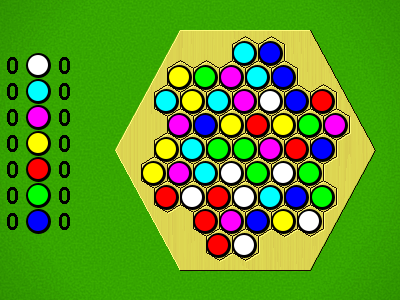
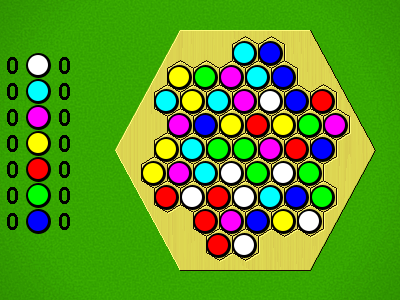
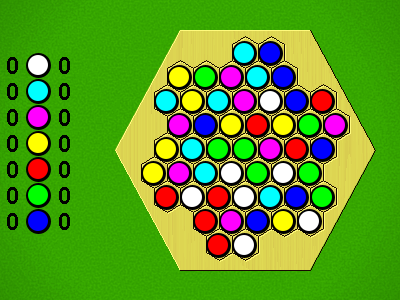
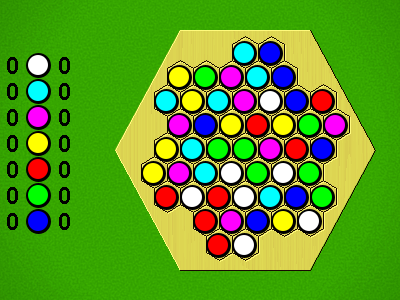
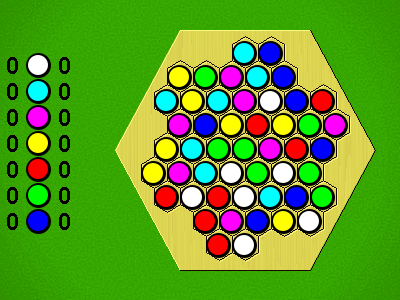
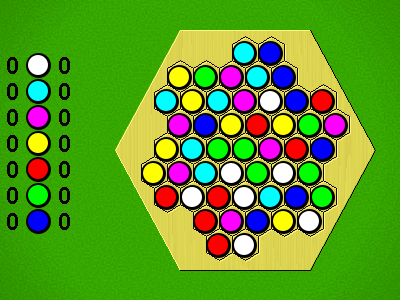
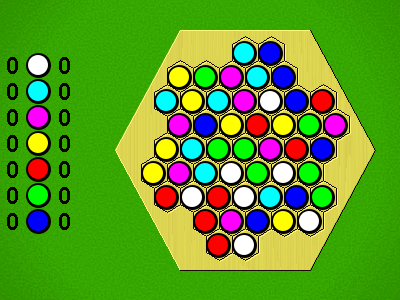
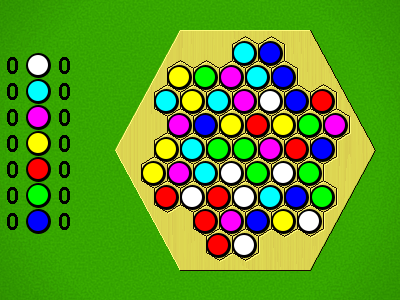
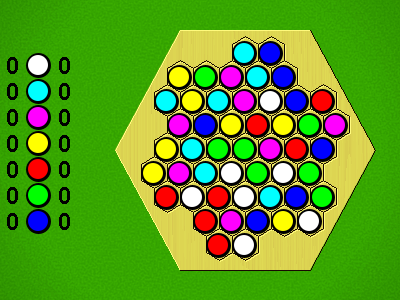
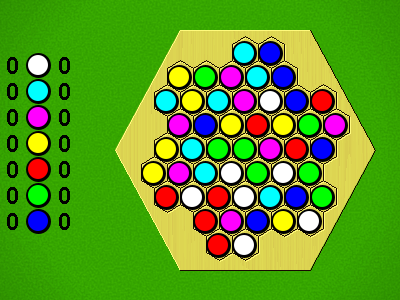
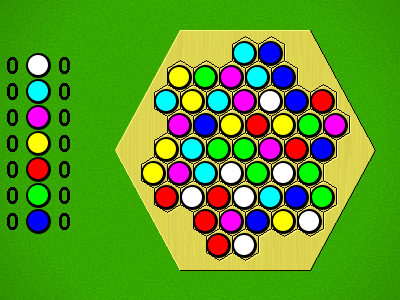
11 solutions found at depth 11.
| Puzzle | Solution |
|---|---|
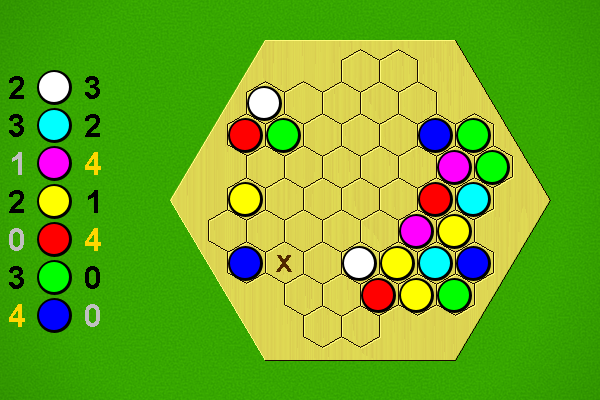 Player 1 to win in 24 moves | |
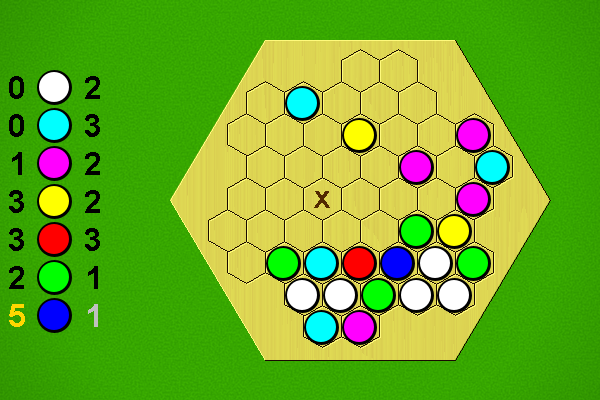 Player 2 to win in 26 moves | |
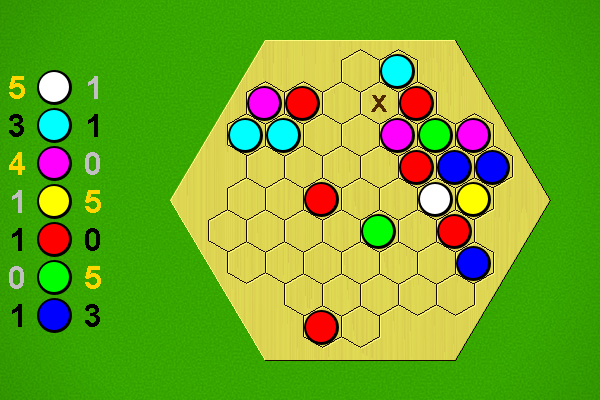 Player 2 to win in 23 moves | |
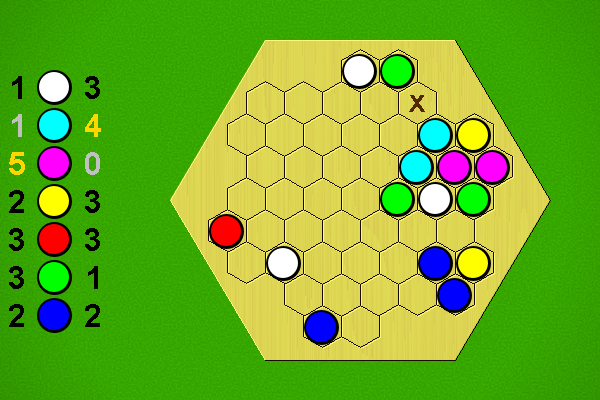 Player 1 to win in 20 moves | |
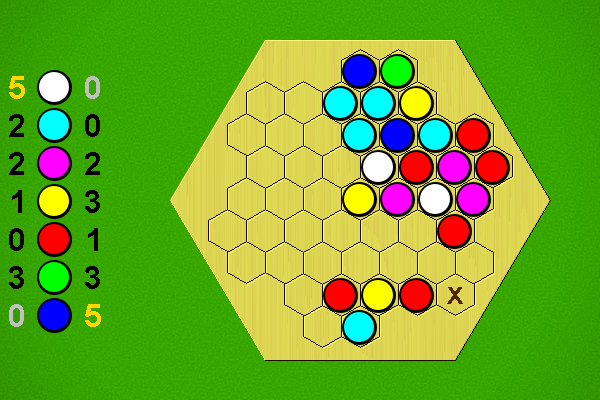 Player 2 to win in 27 moves | |
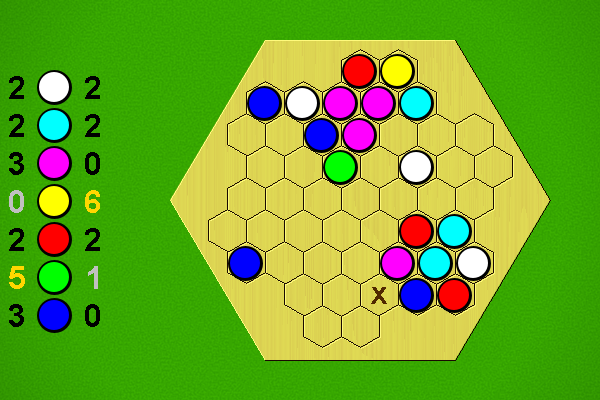 Player 1 to win in 25 moves | |
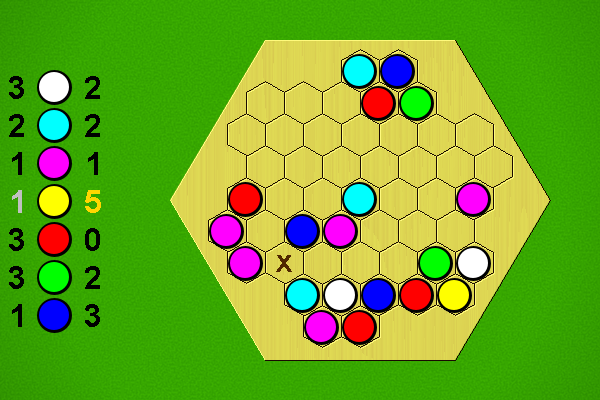 Player 1 to win in 23 moves | |
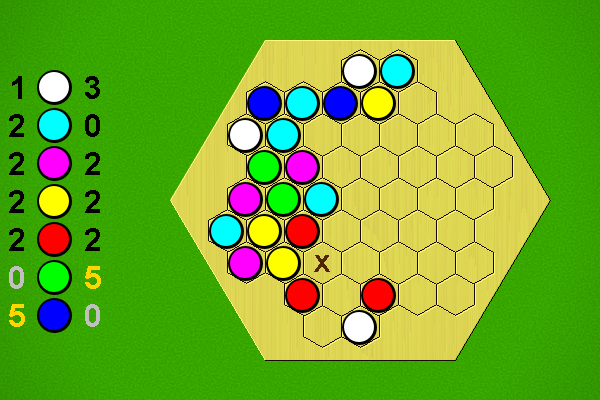 Player 2 to win in 26 moves | |
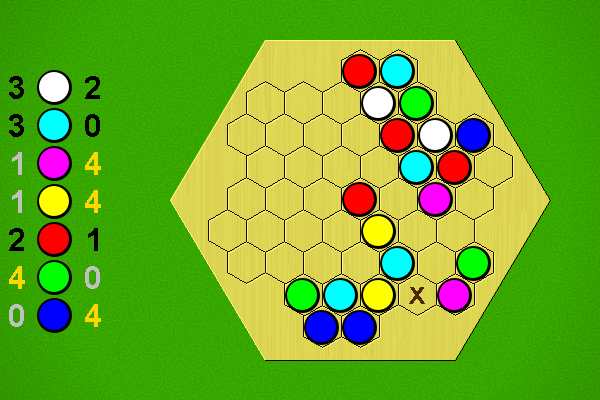 Player 2 to win in 25 moves | |
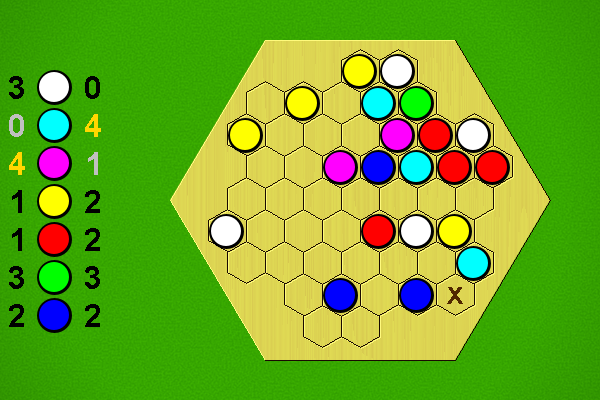 Player 1 to win in 26 moves | |
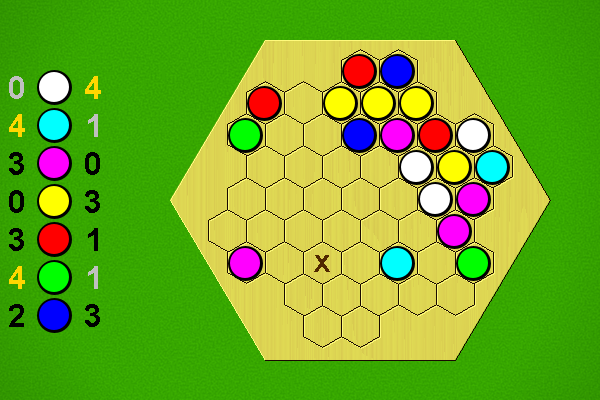 Player 1 to win in 25 moves | |
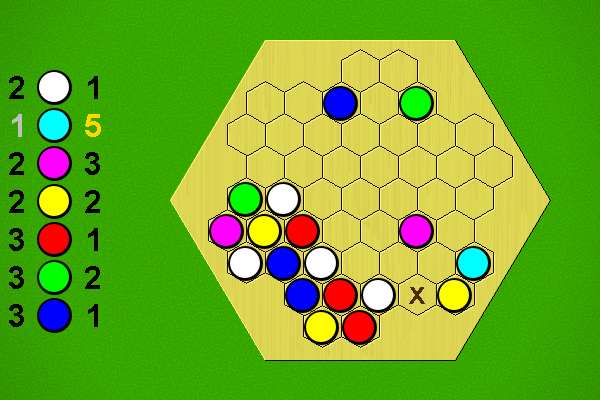 Player 1 to win in 22 moves | |
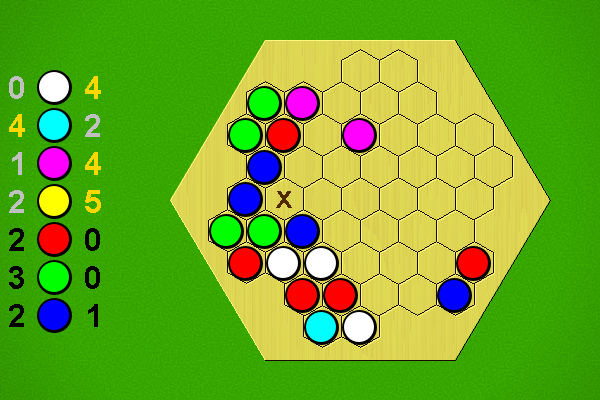 Player 1 to win in 25 moves | |
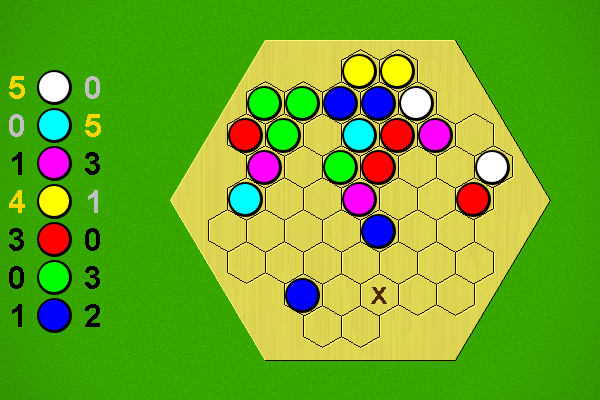 Player 1 to win in 24 moves | |
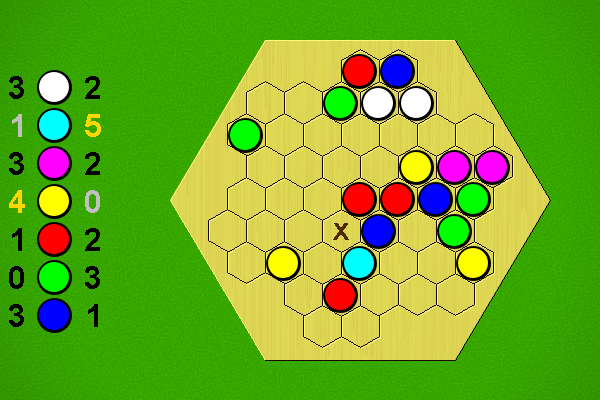 Player 2 to win in 23 moves | |
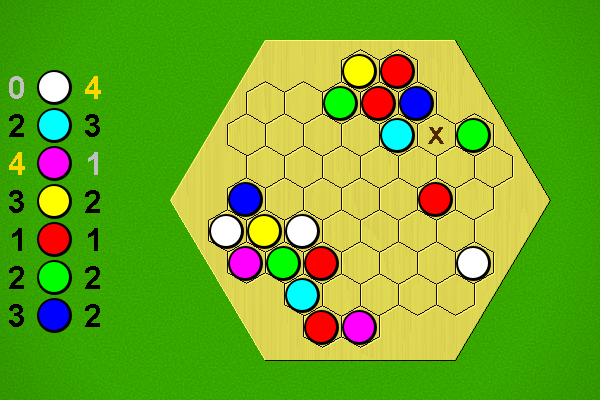 Player 2 to win in 22 moves | |
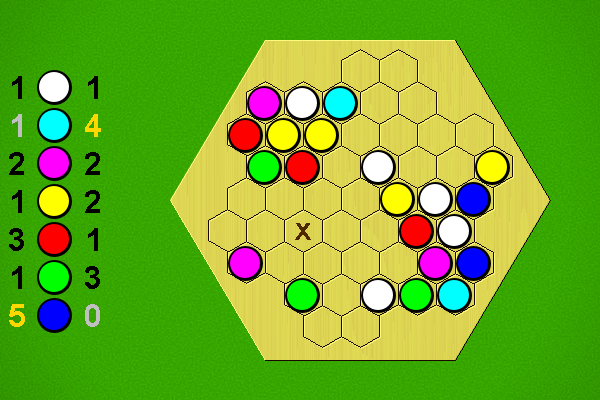 Player 1 to win in 26 moves | |
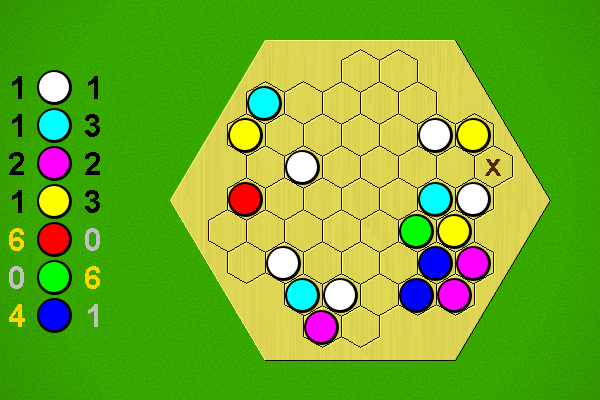 Player 1 to win in 21 moves | |
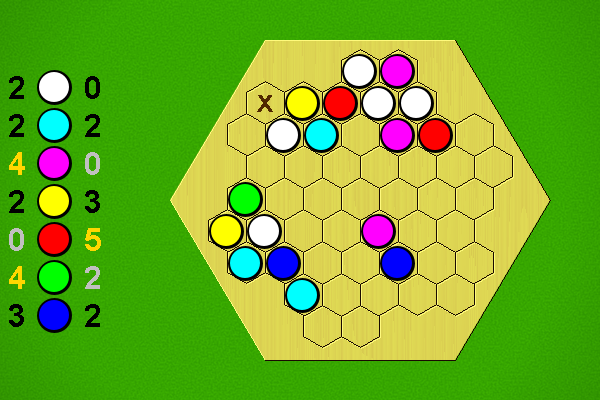 Player 1 to win in 22 moves | |
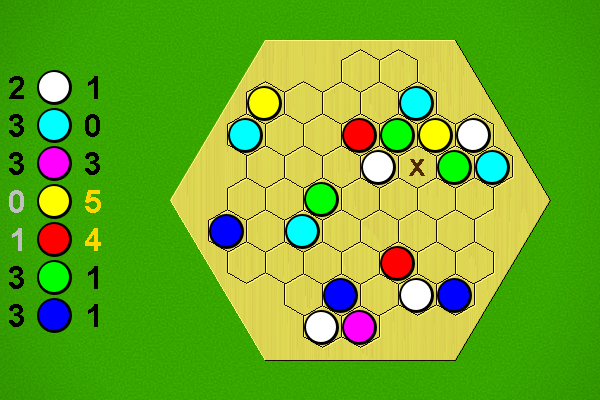 Player 2 to win in 21 moves | |
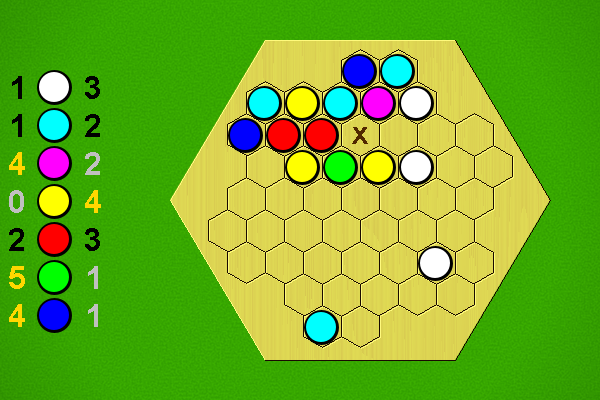 Player 1 to win in 17 moves | |
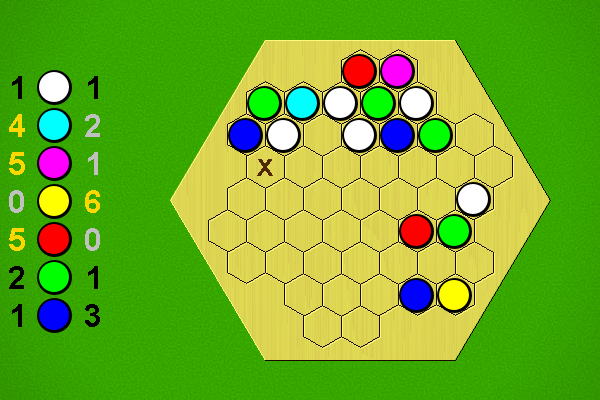 Player 1 to win in 21 moves | |
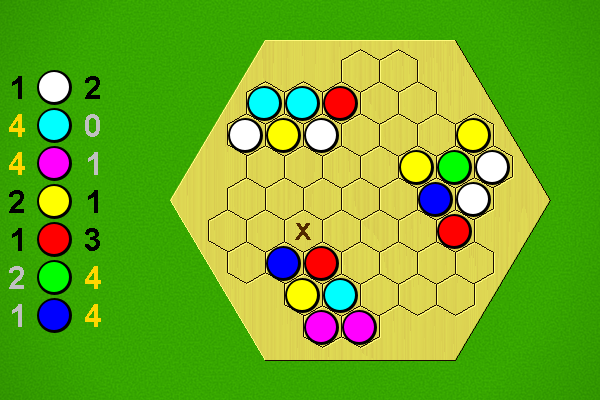 Player 2 to win in 23 moves | |
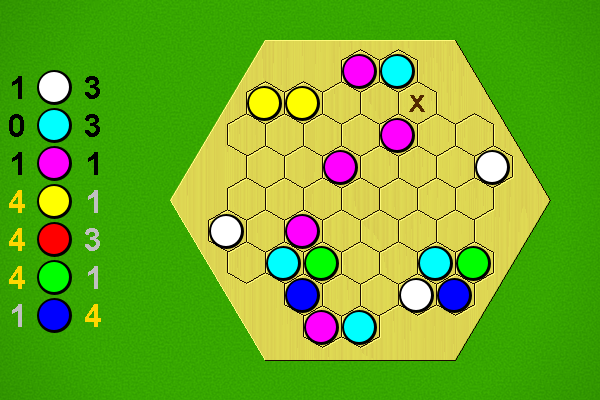 Player 2 to win in 22 moves |
Selection criteria: first move must be unique, and not forced to avoid losing. Beyond that, Puzzles will be rated by the product of [total move]/[best moves] at each step, and the best puzzles selected.